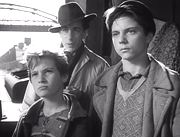In an early episode in Shoeshine, two boyhood friends, Giuseppe (Rinaldo Smordoni) and Pasquale (Franco Interlenghi), bargain with an opportunistic fortune teller named Anselmi (Maria Campi) over the sale of used American-made blankets before convincing the shrewd woman to give them a reading of their future. As the boys huddle curiously over a deck of tarot cards dealt on the table, the fortune teller gradually deciphers their mystical sequence, like tantalizing fragments of an unfinished existential puzzle that forms an image of one’s destiny. Revealing Pasquale’s second card – the one that represents the “outside” factor that would influence his fate – she envisions the presence of a “gentleman” who seems protective of the boy. The seemingly ambiguous divination proves to be accurately (and ominously) portentous as a knock on the woman’s front door disrupts their casual meeting, followed by the appearance of a band of dubious, abrasive men claiming to be from the police department who coerce their way into the fortune teller’s home in an apparent raid to confiscate goods and profits as part of an investigation into her black market trafficking. The convenient and timely arrival of the police is, of course, a staged event, as Giuseppe’s older brother Atillio and his mob boss, Panza (Gino Saltamerenda) – who had earlier provided the boys with the blankets as well as the specific address to go to in order to conduct the sale – are discovered to be among the impersonating thieves. From this singular act of unwitting complicity, Giuseppe and Pasquale’s destiny would be inextricably sealed as the fortune teller identifies them as conspirators in the robbery and, unwilling to implicate Atillio, the two are sent to a juvenile correction facility for questioning and detention.
Vittorio De Sica creates a lucid, sincere, and impassioned portrait of poverty, corruption, and desolation in Shoeshine. From the introductory images of ubiquitous American soldiers at an economically (and perhaps, militarily) ravaged town (note their presence at the sanctuary of the horse rental stable as well as the high-traffic streets where the shoeshine boys eke out a meager living from their almost exclusively foreign patrons), De Sica establishes a recurring metaphor for the pervasive external, environmental factors that invariably exert an influence (if not govern) Giuseppe and Pasquale’s lives that exist beyond their control. In essence, it is this external force – the “outside gentleman” that the fortune teller foretells – that serves, not only as an oblique reference to the presence of Allied occupation forces in postwar Italy, but also as a representation of the country’s sentiment over their ambivalence and inutility towards the direction and scope of the reconstruction in their own country. Moreover, Pasquale’s orphaning during the war and the status of Giuseppe’s family as refugees forced to share a single room at a multi-family boarding house further underscore the boys’ (and, in turn, the country’s) sense of transience, dislocation, and impotence over their own plight and the determination of their future. It is through this systematic disillusionment that the indelible bookend image of the two friends and their beloved white horse becomes, not a euphoric expression of unbridled freedom, but a desperate, resigned rejection of its severe, inscrutable, and dehumanizing course.
© Acquarello 2004. All rights reserved.
